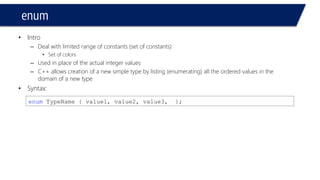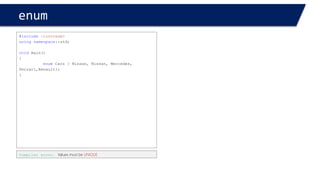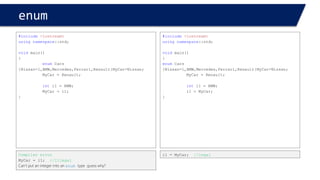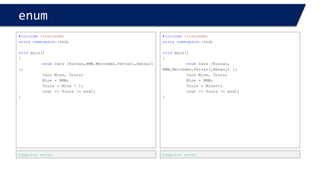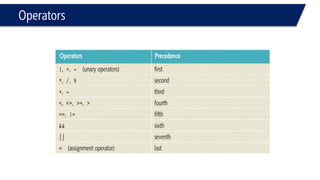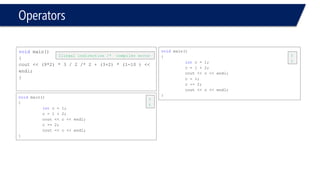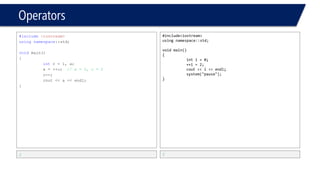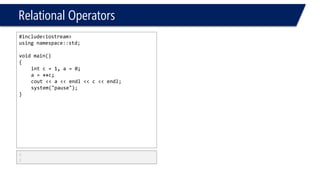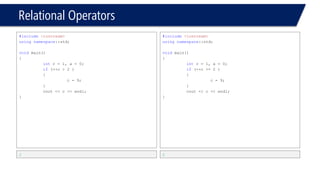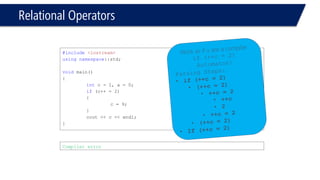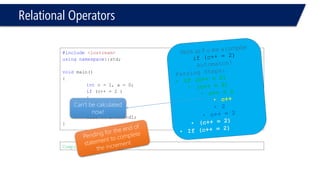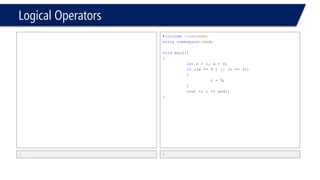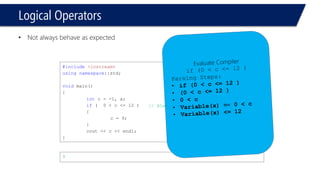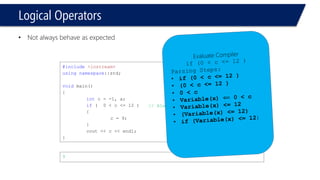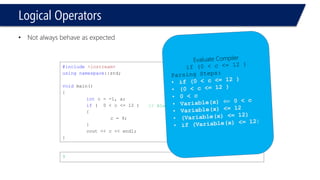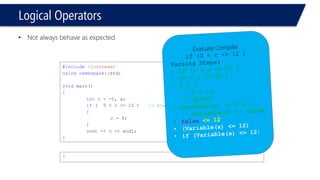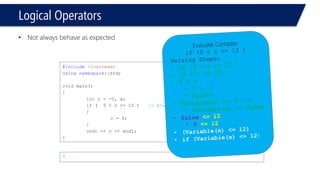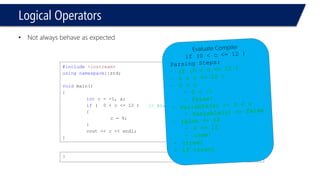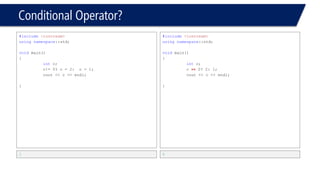C++ L02-Conversion+enum+Operators
- 1. Mohammad Shaker mohammadshaker.com @ZGTRShaker 2010, 11, 12, 13, 14 C++ Programming Language L02 -CONVERSION+ENUM +OPERATORS
- 3. Type Conversion •Used when different data types are used together –Expression •Arithmetic •Relational –Assignment operations –Parameter passage ( through functions ) –Return type ( From Value-Returning functions )
- 4. Type Conversion •Two types of Conversion: –Implicit •Promotion (widening, upcast ) –Promote a smaller type to a larger one »Thus, no loss of data –How to promote? »1st:Promotion »2nd: Arithmetic •Demotion –Demote a larger type to a smaller one »Thus, maybe loss of data! –Explicit
- 5. Type Conversion –Implicit promotion •How to promote? –bool, int, char, short, enum •Promoted to int •Integral values that can’t be represented as intare promoted to unsigned –if the expression still of a mixed type, the follow will be applied: Long double double float Unsigned long long unsigned int •Note: –When using “=” operator, the expression on the right will be converted to the type of the left
- 6. Type Conversion –Implicit promotion float x = 7; // 7 “int” is promoted to float inti1; char i2; float i3; i1 + i2 + i3 // i1, i2 are promoted to float 3.4 + ‘b’// b “char” is promoted to double 3.43265L + ‘b’// b “int” is promoted to Long double inti1; inti2; double i3; i1 + i2 + i3 // i1, i2 are promoted to double inti1; double i3; i1 + ‘N’ + i3 // i1, N are promoted to double intx = 7.4; // 7 “double” is demoted to int= 7 loss of data!
- 7. Type Conversion –Explicit promotion float x = float(7); // becomes 7.0 float x = (float)7;// becomes 7.0 int(7.6)// becomes 7 (int) 7.6// becomes 7 float (7/4) = 1.0 7/4 = 1 float(7) / float(4) = 1.75 double(7) / double(4) = 1.75
- 8. Type Conversion –Explicit Casting #include<iostream> usingnamespace::std; voidmain() { charc; inti; i= c;// implicit casting cout<< i<< endl; } 0 #include<iostream> usingnamespace::std; voidmain() { charcece= 'c'; inti; i= cece; // implicit casting cout<< i<< endl; } 99
- 9. Type Conversion –Explicit Casting #include<iostream> usingnamespace::std; voidmain() { charcece= 'c'; inti= cece; // implicit casting cout<< i<< endl; } 99 #include<iostream> usingnamespace::std; voidmain() { charcece= 'c'; inti; i= int(cece); // explicit casting cout<< i<< endl; } 99
- 10. Type Conversion –Explicit Casting #include <iostream> using namespace::std; void main() { char c = 'c'; inti; i= int(c -'d');// explicit casting cout<< i<< endl; } -1 #include <iostream> using namespace::std; void main() { char c = 'c'; inti; i= int(c -'c');// explicit casting cout<< i<< endl; } 0
- 11. Type Conversion –Explicit Casting #include <iostream> using namespace::std; void main() { char c = 'c'; inti; i= int(c -‘2');// explicit casting cout<< i<< endl; } 49 #include <iostream> using namespace::std; void main() { char c = 'c'; inti; i= int(c -‘0');// explicit casting cout<< i<< endl; } 51
- 12. Type Conversion –Explicit Casting •Types of explicating Casting –static_cast –dynamic_cast –const_cast –reinterpret_cast
- 13. Explicit Casting –static_castAt compile time! Thus, Type & object should be fully known at compile time
- 14. Explicit Casting –static_cast •We were used to do that •Now, we can do that (Not necessary, just highlighting the cast) #include<iostream> usingnamespace::std; voidmain() { inti = 25;longl; floatf; l = i; f = i; } #include<iostream> usingnamespace::std; voidmain() { inti = 25; longl; floatf; l = static_cast<long>(i1); f = static_cast<float>(i1); }
- 15. Type Conversion –Explicit Casting #include<iostream> usingnamespace::std; voidmain() { inti1 = 25; longi2; floati3; i1 = i2; i1 = i3; i2 = i3; } Compile & Run (with warnings) #include<iostream> usingnamespace::std; voidmain() { inti1 = 25; longi2; floati3; i1 = static_cast<long>(i2); i1 = static_cast<float>(i3); i2 = static_cast<long>(i3); } Compile & Run (No warnings since we used static_cast)
- 16. enum
- 17. Float, double, long double C++ data types Structured Simple Address Pointer Reference enum Floating Array Struct Union Class Char, Short, int, long, yool Integral
- 18. enum •Intro –Deal with limited range of constants (set of constants) •Set of colors –Used in place of the actual integer values –C++ allows creation of a new simple type by listing (enumerating) all the ordered values in the domain of a new type •Syntax: enumTypeName{ value1, value2, value3, };
- 19. enum •Declaring variables from the “enumerated” type #include<iostream> usingnamespace::std; voidmain() { enumCars {Nissan = 1, BMW,Mercedes,Ferrari,Renault}; Cars MyCar, YourCar; } #include<iostream> usingnamespace::std; voidmain() { enumCars { Nissan = 1, BMW, Mercedes, Ferrari, Renault } MyCar, YourCar; }
- 20. enum #include<iostream> usingnamespace::std; voidmain() { enumCars { Nissan, Nissan, Mercedes, Ferrari,Renault}; } Compiler error. Values must be UNIQUE
- 21. enum #include<iostream> usingnamespace::std; voidmain() { enumCars { Nissan = 1, BMW, Mercedes, Ferrari,Renault}; } Nissan < BMW < Mercedes < The Values are ordered from 1upward Nissan = 1 BMW = 2 Mercedes = 3 #include<iostream> usingnamespace::std; voidmain() { enumCars { Nissan, BMW, Mercedes, Ferrari,Renault}; } Nissan < BMW < Mercedes < The defaultValues are ordered from 0 upward Nissan = 0 BMW = 1 Mercedes = 2
- 22. enum #include<iostream> usingnamespace::std; voidmain() { enumCars {Nissan = 1, BMW, Mercedes = 7, Ferrari, Renault }; cout<< Renault; } 9 #include<iostream> usingnamespace::std; voidmain() { enumCars { Nissan = 1, BMW, Mercedes = 5, Ferrari,Renault}; } The Values are incremented by 1 Nissan = 1, BMW = 2 Mercedes = 5, Ferrari = 6, Renault = 7
- 23. enum #include<iostream> usingnamespace::std; voidmain() { enumCars { Nissan = 1, BMW, Mercedes = BMW + 4, Ferrari,Renault= Renault + 2}; } Complier error Renault undeclared identifier #include<iostream> usingnamespace::std; voidmain() { enumCars { Nissan = 1, BMW, Mercedes = BMW + 4, Ferrari,Renault= Ferrari + 2}; } The Values are incremented by 1upward Nissan = 1, BMW = 2 Mercedes = 6, Ferrari = 7, Renault = 9
- 24. enum #include<iostream> usingnamespace::std; voidmain() { enumCars { Nissan = 1, BMW, Mercedes = 1, Ferrari,Renault}; } The values are ordered from 1upward Nissan = 1, BMW = 2 Mercedes = 1, Ferrari = 2, Renault = 3
- 25. enum #include<iostream> usingnamespace::std; voidmain() { // Declare MyCarof type Cars and initialize it to Nissan enumCars{ Nissan,BMW,Mercedes,Ferrari,Renault} MyCar= Nissan; } Compile and run #include<iostream> usingnamespace::std; voidmain() { enumCars { Nissan = 1, BMW, Mercedes,Ferrari, Renault }; Cars MyCar, YourCar; cout<< MyCar; } 0
- 26. enum #include<iostream> usingnamespace::std; voidmain() { enumCars {Nissan=1,BMW,Mercedes,Ferrari,Renault} MyCar=Nissan; MyCar= Renault;// legal inti1 = BMW, i2 = Mercedes;// legal i2 = Ferrari;// legal cout<< "i2 = "<< i2 << endl; } i2 = 4
- 27. enum #include<iostream> usingnamespace::std; voidmain() { enumCars {Nissan=1,BMW,Mercedes,Ferrari,Renault}MyCar=Nissan; MyCar= Renault; inti1 = BMW; i1 = MyCar; } i1 = MyCar; //legal #include<iostream> usingnamespace::std; voidmain() { enumCars {Nissan=1,BMW,Mercedes,Ferrari,Renault}MyCar=Nissan; MyCar= Renault; inti1 = BMW; MyCar= i1; } Compiler error MyCar= i1; //illegal Can’t put an integer into an enumtype. guess why?
- 28. enum #include<iostream> usingnamespace::std; voidmain() { enumCars {Nissan,BMW,Mercedes,Ferrari,Renault}; Cars Mine, Yours; Mine = BMW; Yours = Mine; cout<< Yours << endl; } 1 #include<iostream> usingnamespace::std; voidmain() { enumCars { Nissan, BMW,Mercedes,Ferrari,Renault}; Cars Mine, Yours; Mine = BMW; Mine = Yours; cout<< Mine << endl; } 0
- 29. enum #include<iostream> usingnamespace::std; voidmain() { enumCars {Nissan, BMW,Mercedes,Ferrari,Renault}; Cars Mine, Yours; Mine = BMW; Yours = Mine++; cout<< Yours << endl; } Compiler error #include<iostream> usingnamespace::std; voidmain() { enumCars {Nissan,BMW,Mercedes,Ferrari,Renault}; Cars Mine, Yours; Mine = BMW; Yours = Mine + 1; cout<< Yours << endl; } Compiler error
- 30. Operators
- 31. Operators •Assignment –b = 5;// a = 5 –a = 3 + (b = 6 ); // a = 8 –a = b = 5;// legal a = b = 5 •Equality –2 == 2 // true –2 == 3 // false •Arithmetic Operation –+, -, *, /, %
- 32. Operators •Division / –The result of division depends on the type of the two operands •If one of the operands is float –The result is float typed •Otherwise –The result is integer typed –Examples: •13 / 4 = 3 •13.0 / 4 = 3.25 •13 / 4.0 = 3.25 •13.0 / 4.0 = 3.25 •Mod % –Applied to integer types only –Operands: •Both positive –Result is positive •One or both negative –Result is machine-dependent
- 33. Operators 11.3 % 4; Compiler error, left side is a double 22 % 7; 1 21 % 7; 0 2%6; 2 23%-6; 5 -23%-6; -5 2%-6; 2
- 34. Operators Rules of Precedence
- 35. Operators •Rules of precedence: –1st: () •When multi nested () –Inners come first –2nd: *, /, % •Left to right –3rd: +, - •Left to right
- 36. Operators
- 37. Operators voidmain() { cout<< (9*2) * 3 / 2 / 2 + (3+2) * (1-10 ) << endl; } voidmain() { cout<< 9*2 * 3 / 2 / 2 + (3+2) * (1-10 ) << endl; } #include<iostream> usingnamespace::std; voidmain() { cout<< 3/2 << endl; } voidmain() { cout<<(float)3/2<<endl; system("pause"); } 1 (int) 1.5 -32 -32
- 38. Operators voidmain() { cout<< (9*2) * 3 / 2 /* 2 + (3+2) * (1-10 ) << endl; } voidmain() { intc = 1; c = 1 + 2; cout<< c << endl; c += 2; cout<< c << endl; } voidmain() { intc = 1; c = 1 + 2; cout<< c << endl; c = 1; c += 2; cout<< c << endl; } 3 3 Illegal indirection /* compiler error 3 5
- 39. Operators •Special Case: –When incrementing “+” or decrementing “-” by 1 •All are the same: b = b + 1; b += 1; b++;
- 40. Operators #include<iostream> usingnamespace::std; voidmain() { intc = 1; c++; c--; cout<< c << endl; } 1 #include<iostream> usingnamespace::std; voidmain() { intc = 1; ++c; cout<< c << endl; } 2
- 41. Operators #include<iostream> usingnamespace::std; voidmain() { intc = 1; --c; cout<< c << endl; } 0 #include<iostream> usingnamespace::std; voidmain() { intc; c = 1; cout<< c++<< endl; } 1
- 42. Operators #include<iostream> usingnamespace::std; voidmain() { intc = 1, a; a = ++c;// a = 2, c = 2 c--; cout<< a << endl; } 2 #include<iostream> usingnamespace::std; voidmain() { inti=0; ++i=2; cout<<i<<endl; system("pause"); } 2
- 43. Operators #include<iostream> usingnamespace::std; voidmain() { inti=0; i++=2; cout<<i<<endl; system("pause"); } Compiler error
- 46. Relational Operators voidmain() { intc=1, a=0; if(c==2) { c=9; } cout<<c<<endl; system("pause"); } 1 #include<iostream> usingnamespace::std; voidmain() { intc=1, a=0; if(c++==2) { c=9; } cout<<c<<endl; system("pause"); } 2
- 47. Relational Operators #include<iostream> usingnamespace::std; voidmain() { intc=1, a=0; if(++c==2) { c=9; } cout<<c<<endl; system("pause"); } 9 #include<iostream> usingnamespace::std; voidmain() { intc=1, a=0; if(c=2) { c=9; } cout<<c<<endl; system("pause"); } 9
- 48. Relational Operators #include<iostream> usingnamespace::std; voidmain() { intc=1, a=0; if(c=2) { c=9; } cout<<c<<endl; system("pause"); } 9 #include<iostream> usingnamespace::std; voidmain() { intc=1, a=0; a=c++; cout<<a<<endl<<c<<endl; system("pause"); } 1 2
- 49. Relational Operators #include<iostream> usingnamespace::std; voidmain() { intc=1, a=0; a=++c; cout<<a<<endl<<c<<endl; system("pause"); } 2 2
- 50. Relational Operators c++ ++c Introduce a L-VALUE nota variable Introduce a VARIABLE nota value or L-Value
- 51. Relational Operators c++ ++c Introduce a L-VALUE nota variable Introduce a VARIABLE nota value or L-Value Can be assigned! Can’t be assigned!
- 52. Relational Operators c++ Introduce a L-VALUE nota variable •What is l-VALUE? Expressions that refer to memory locations are called "l-value" expressions. An l-value represents a storage region's "locator" value, or a "left" value, implying that it can appear on the left of the equal sign (=). L-values are often identifiers.
- 53. Relational Operators #include<iostream> usingnamespace::std; voidmain() { intc=1, a=0; c++= a; cout<<a<<endl<<c<<endl; system("pause"); } #include<iostream> usingnamespace::std; voidmain() { intc=1, a=0; ++c = a; cout<<a<<endl<<c<<endl; system("pause"); } Compiler error! 0 0 Variable can be assigned! l-Value can’t be assigned!
- 54. Relational Operators #include<iostream> usingnamespace::std; voidmain() { intc = 1, a = 0; if(c++> 2 ) { c = 9; } cout<< c << endl; } 2 #include<iostream> usingnamespace::std; voidmain() { intc = 1, a = 0; if(c++>= 2 ) { c = 9; } cout<< c << endl; } 2
- 55. Relational Operators #include<iostream> usingnamespace::std; voidmain() { intc = 1, a = 0; if(++c > 2 ) { c = 9; } cout<< c << endl; } 2 #include<iostream> usingnamespace::std; voidmain() { intc = 1, a = 0; if(++c >= 2 ) { c = 9; } cout<< c << endl; } 9
- 56. Relational Operators #include<iostream> usingnamespace::std; voidmain() { intc = 1, a = 0; if(++c = 2 ) { c = 9; } cout<< c << endl; } 9
- 57. Relational Operators #include<iostream> usingnamespace::std; voidmain() { intc = 1, a = 0; if(c++= 2) { c = 9; } cout<< c << endl; } Compiler error
- 58. Relational Operators #include<iostream> usingnamespace::std; voidmain() { intc = 1, a = 0; if(c++= 2 ) { c = 9; } cout<< c << endl; } Compiler error
- 59. Relational Operators #include<iostream> usingnamespace::std; voidmain() { intc = 1, a = 0; if(c++= 2 ) { c = 9; } cout<< c << endl; } Compiler error
- 60. Relational Operators #include<iostream> usingnamespace::std; voidmain() { intc = 1, a = 0; if(c++= 2 ) { c = 9; } cout<< c << endl; } Compiler error
- 61. Relational Operators #include<iostream> usingnamespace::std; voidmain() { intc = 1, a = 0; if(c++= 2 ) { c = 9; } cout<< c << endl; } Compiler error
- 62. Relational Operators #include<iostream> usingnamespace::std; voidmain() { intc = 1, a = 0; if(c++= 2 ) { c = 9; } cout<< c << endl; } Compiler error
- 63. Relational Operators #include<iostream> usingnamespace::std; voidmain() { intc = 1, a = 0; if(c++= 2 ) { c = 9; } cout<< c << endl; } Compiler error l-Value must not be assigned
- 64. Relational Operators #include<iostream> usingnamespace::std; voidmain() { intc = 1, a = 0; if(c++= 2 ) { c = 9; } cout<< c << endl; } Compiler error l-Value must not be assigned
- 65. Relational Operators #include<iostream> usingnamespace::std; voidmain() { intc = 1, a = 0; if(c++= 2 ) { c = 9; } cout<< c << endl; } Compiler error l-Value must not be assigned
- 66. Relational Operators #include<iostream> usingnamespace::std; voidmain() { intc = 1, a = 0; if(c++= 2 ) { c = 9; } cout<< c << endl; } Compiler error Let’s roll back to here
- 67. Relational Operators #include<iostream> usingnamespace::std; voidmain() { intc = 1, a = 0; if(c++= 2 ) { c = 9; } cout<< c << endl; } Compiler error Can’t be calculated now!
- 68. Relational Operators #include<iostream> usingnamespace::std; voidmain() { intc = 1, a = 0; if(c++= 2 ) { c = 9; } cout<< c << endl; } Compiler error Can’t be calculated now!
- 69. Relational Operators #include<iostream> usingnamespace::std; voidmain() { intc = 1, a = 0; if(c++= 2 ) { c = 9; } cout<< c << endl; } Compiler error Can’t be calculated now!
- 70. Relational Operators #include<iostream> usingnamespace::std; voidmain() { intc = 1, a = 0; if(c++= 2 ) { c = 9; } cout<< c << endl; } Compiler error Can’t be calculated now!
- 71. Relational Operators #include<iostream> usingnamespace::std; voidmain() { intc = 1, a = 0; if(c++= 2 ) { c = 9; } cout<< c << endl; } Compiler error Can’t be calculated now!
- 72. Relational Operators #include<iostream> usingnamespace::std; voidmain() { intc = 1, a = 0; if(c++= 2 ) { c = 9; } cout<< c << endl; } Compiler error Can’t be calculated now!
- 74. Relational Operators with strings •Comparing with collating sequence •If the strings have different lenghts –The shorter one is smaller that the larger str1 = “Hello” str2 = “Hi” str3 = “Air” str4 = “Bill”
- 76. Logical Operators #include<iostream> usingnamespace::std; voidmain() { intc = 1, a = 0; if((a == 0 ) || (c == 3)) { c = 9; } cout<< c << endl; } 9
- 77. Logical Operators #include<iostream> usingnamespace::std; voidmain() { intc = 1, a = 0; if(!(a) > 2 ) { c = 9; } cout<< c << endl; } 1 #include<iostream> usingnamespace::std; voidmain() { intc = 1, a = 0; if((a == 2 ) && (c == 3)) { c = 9; } cout<< c << endl; } 9
- 78. Logical Operators #include<iostream> usingnamespace::std; voidmain() { intc = 1, a; if((a == 0 ) && (c == 1)) { c = 9; } cout<< c << endl; } 9 #include<iostream> usingnamespace::std; voidmain() { intc = 1, a; if((a == 0 ) && (c == 2)) { c = 9; } cout<< c << endl; } 1
- 79. Logical Operators #include<iostream> usingnamespace::std; voidmain() { intc = 1, a; if(a == 0 ) && (c == 2) { c = 9; } cout<< c << endl; } Compiler error #include<iostream> usingnamespace::std; voidmain() { intc = 0, a; if(( 0 < c ) && ( c <= 12 )) { c = 9; } cout<< c << endl; } 0
- 80. Logical Operators •Not always behave as expected #include<iostream> usingnamespace::std; voidmain() { intc = -1, a; if( 0 < c <= 12 ) { c = 9; } cout<< c << endl; } 9 // Always evaluated true!
- 81. Logical Operators •Not always behave as expected #include<iostream> usingnamespace::std; voidmain() { intc = -1, a; if( 0 < c <= 12 ) { c = 9; } cout<< c << endl; } 9 // Always evaluated true!
- 82. Logical Operators •Not always behave as expected #include<iostream> usingnamespace::std; voidmain() { intc = -1, a; if( 0 < c <= 12 ) { c = 9; } cout<< c << endl; } 9 // Always evaluated true!
- 83. Logical Operators •Not always behave as expected #include<iostream> usingnamespace::std; voidmain() { intc = -1, a; if( 0 < c <= 12 ) { c = 9; } cout<< c << endl; } 9 // Always evaluated true!
- 84. Logical Operators •Not always behave as expected #include<iostream> usingnamespace::std; voidmain() { intc = -1, a; if( 0 < c <= 12 ) { c = 9; } cout<< c << endl; } 9 // Always evaluated true!
- 85. Logical Operators •Not always behave as expected #include<iostream> usingnamespace::std; voidmain() { intc = -1, a; if( 0 < c <= 12 ) { c = 9; } cout<< c << endl; } 9 // Always evaluated true!
- 86. Logical Operators •Not always behave as expected #include<iostream> usingnamespace::std; voidmain() { intc = -1, a; if( 0 < c <= 12 ) { c = 9; } cout<< c << endl; } 9 // Always evaluated true!
- 87. Logical Operators •Not always behave as expected #include<iostream> usingnamespace::std; voidmain() { intc = -1, a; if( 0 < c <= 12 ) { c = 9; } cout<< c << endl; } 9 // Always evaluated true!
- 88. Logical Operators •Not always behave as expected #include<iostream> usingnamespace::std; voidmain() { intc = -1, a; if( 0 < c <= 12 ) { c = 9; } cout<< c << endl; } 9 // Always evaluated true!
- 89. Logical Operators •Not always behave as expected #include<iostream> usingnamespace::std; voidmain() { intc = -1, a; if( 0 < c <= 12 ) { c = 9; } cout<< c << endl; } 9 // Always evaluated true!
- 90. Logical Operators •Not always behave as expected #include<iostream> usingnamespace::std; voidmain() { intc = -1, a; if( 0 < c <= 12 ) { c = 9; } cout<< c << endl; } 9 // Always evaluated true!
- 91. Logical Operators •Not always behave as expected #include<iostream> usingnamespace::std; voidmain() { intc = -1, a; if( 0 < c <= 12 ) { c = 9; } cout<< c << endl; } 9 // Always evaluated true!
- 92. Logical Operators •Not always behave as expected #include<iostream> usingnamespace::std; voidmain() { intc = -1, a; if( 0 < c <= 12 ) { c = 9; } cout<< c << endl; } 9 // Always evaluated true!
- 93. Logical Operators •Not always behave as expected #include<iostream> usingnamespace::std; voidmain() { intc = -1, a; if( 0 < c <= 12 ) { c = 9; } cout<< c << endl; } 9 // Always evaluated true!
- 94. Logical Operators •Not always behave as expected #include<iostream> usingnamespace::std; voidmain() { intc = -1, a; if( 0 < c <= 12 ) { c = 9; } cout<< c << endl; } 9 // Always evaluated true!
- 95. Logical Operators •Not always behave as expected #include<iostream> usingnamespace::std; voidmain() { intc = -1, a; if( 0 < c <= 12 ) { c = 9; } cout<< c << endl; } 9 // Always evaluated true!
- 96. Logical Operators •Not always behave as expected #include<iostream> usingnamespace::std; voidmain() { intc = -1, a; if( 0 < c <= 12 ) { c = 9; } cout<< c << endl; } 9 // Always evaluated true!
- 97. Logical Operators •Not always behave as expected #include<iostream> usingnamespace::std; voidmain() { intc = -1, a; if( 0 < c <= 12 ) { c = 9; } cout<< c << endl; } 9 // Always evaluated true!
- 98. Logical Operators •Not always behave as expected #include<iostream> usingnamespace::std; voidmain() { intc = -1, a; if( 0 < c <= 12 ) { c = 9; } cout<< c << endl; } 9 // Always evaluated true!
- 99. Logical Operators •Not always behave as expected #include<iostream> usingnamespace::std; voidmain() { intc = -1, a; if( 0 < c <= 12 ) { c = 9; } cout<< c << endl; } 9 // Always evaluated true!
- 100. Logical Operators •Not always behave as expected #include<iostream> usingnamespace::std; voidmain() { intc = -1, a; if( 0 < c <= 12 ) { c = 9; } cout<< c << endl; } 9 // Always evaluated true!
- 101. Logical Operators •Not always behave as expected #include<iostream> usingnamespace::std; voidmain() { intc = -1, a; if( 0 < c <= 12 ) { c = 9; } cout<< c << endl; } 9 // Always evaluated true!
- 102. Conditional Operator? •Condition? Result1: Result2 •Condition –If True •Result1 –Else // condition is false •Result 2
- 103. Conditional Operator? #include<iostream> usingnamespace::std; voidmain() { intc; c ==0? c = 2: c = 1; cout<< c << endl; } 2 #include<iostream> usingnamespace::std; voidmain() { intc; c ==2? c = 2: c = 1; cout<< c << endl; } 1
- 104. Conditional Operator? #include<iostream> usingnamespace::std; voidmain() { intc; c!= 0? c = 2: c = 1; cout<< c << endl; } 1 #include<iostream> usingnamespace::std; voidmain() { intc; c ==0? 2: 1; cout<< c << endl; } 0
- 105. Conditional Operator? #include<iostream> usingnamespace::std; voidmain() { intc; c!= 0? 2: 1; cout<< c << endl; } 0 #include<iostream> usingnamespace::std; voidmain() { intc; c!= 0? c=2: 1; cout<< c << endl; } 0
- 106. Conditional Operator? #include<iostream> usingnamespace::std; voidmain() { intc; c = 0? c=2: 1; cout<< c << endl; } 1 (c = 0) Simply the variable c is assigned 0 If(zero) returns false
- 107. Let’s Crack Some Code
- 108. Code Cracking
- 109. Code Cracking #include<iostream> usingnamespace::std; voidmain() { enumCars {Nissan,BMW,Mercedes, Ferrari,Renault=Nissan--}; Cars MyCar= Renault; } Compiler error Nissan-- #include<iostream> usingnamespace::std; voidmain() { enumCars{Nissan,BMW,Mercedes,Ferrari,Renault++}MyCar=Nissan; } Compiler error Renault++, why?
- 110. Code Cracking #include<iostream> usingnamespace::std; voidmain() { enumCars { Nissan = 2.4,BMW,Mercedes,Ferrari,Renault }MyCar= Nissan; MyCar= Renault; inti1 = MyCar; } Compiler error Nissan = 2.4 must be integer #include<iostream> usingnamespace::std; voidmain() { intc = 1, a; if((a = 0 ) && (c = 2)) { c = 9; } cout<< c << endl; } 9
- 111. Code Cracking #include<iostream> usingnamespace::std; voidmain() { intc = 1, a = 0; if((a = 3) > 2 ) { c = 9; } cout<< c << endl; } 9 #include<iostream> usingnamespace::std; constx = 20; voidmain() { } 2008 Compiler: Compiler error no default intsupported 2005 Compiler: Compile & Run Intassumed
- 112. Code Cracking #include<iostream> usingnamespace::std; voidmain() { intc; if(c++== 1) { cout<< "joo"<<endl; } else { cout<< "yoo"<< endl; } } yoo #include<iostream> usingnamespace::std; voidmain() { intc; if(++c == 1) { cout<< "joo"<<endl; } else { cout<< " "<< endl; } } joo



















